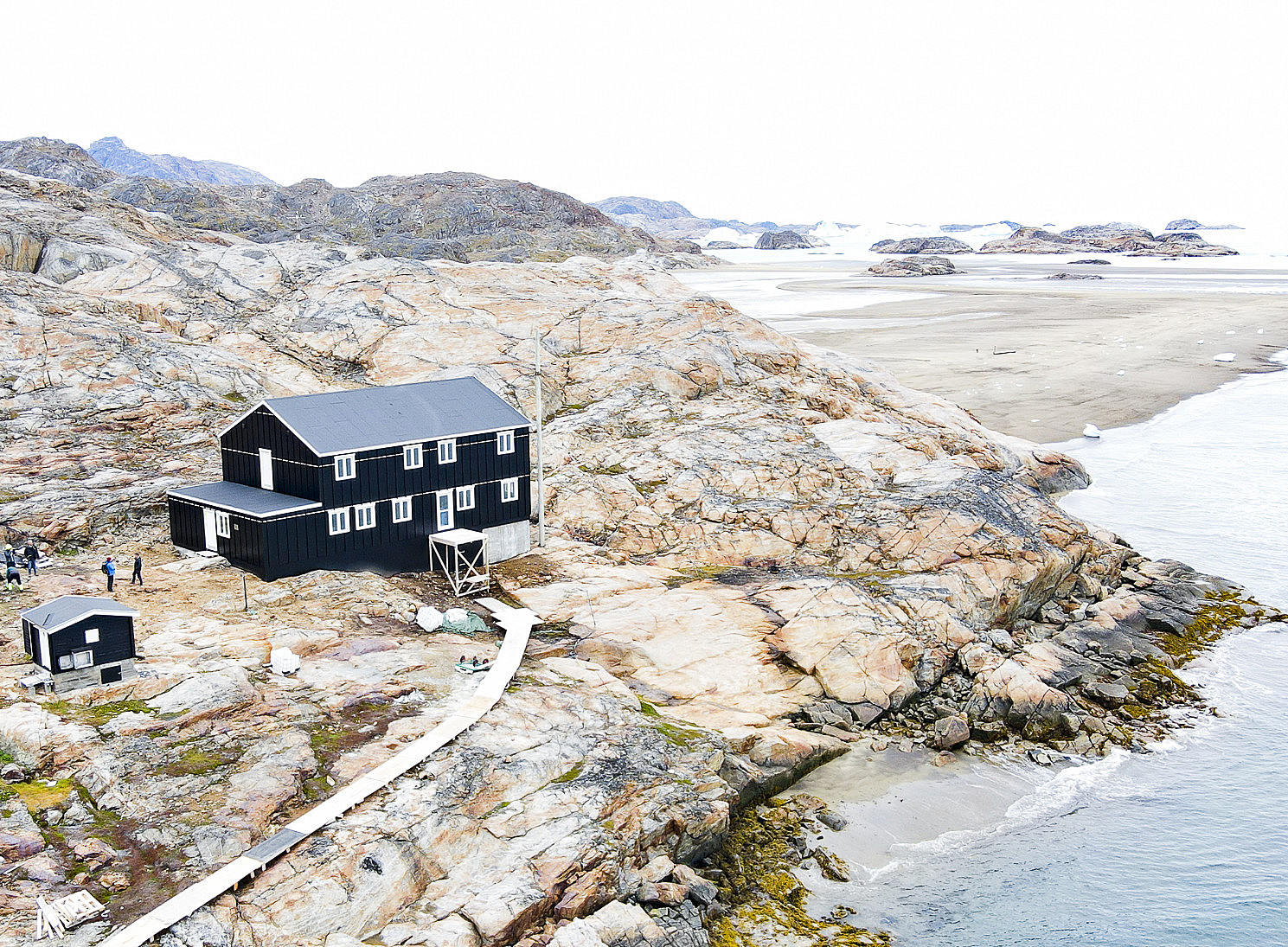In September, a delegation from the University of Graz travelled to East Greenland together with Dr. Christian Palmers for the pre-opening of the new building at the Sermilik research station. With the generous support of Dr. Palmers, the University of Graz has expanded the existing station of the University of Copenhagen. From summer 2024, the building will offer space for 25 researchers.
Situated in the lonely Sermilik Fjord, the station looks like a piece of civilisation in the middle of the untouched Arctic. “We owe the station in its present form to Dr Palmers. It was his initiative that got the ball rolling,” says Peter Riedler, Rector of the University of Graz.
“Austria has a long tradition in polar research, Carl Weyprecht even initiated the international Polar Year. Yet, the country has no research station of its own in the region,” explains Dr Palmers, who has been fascinated by the polar region for years. To change this, he searched for a partner organisation. “The University of Graz, with its long tradition of research in the Arctic, was happy to accept the offer to build a station for Austrian polar research,” says Rector Riedler. “This fits perfectly into our portfolio as a university with a major research focus on climate change.”
Decades of research
The University of Copenhagen has been operating a small research station with six berths in the Sermilik Fjord since the 1970s. A factor that was decisive for the choice of location, says Wolfgang Schöner, professor at the Institute of Geography and Spatial Research at the University of Graz. The Mittivakkat Glacier, which is close to the station, is one of the best-studied glaciers in Greenland. “Therefore, this is a perfect place to identify and understand the changes in Greenland's glaciers caused by global warming. This is where our researchers pick up and make an important contribution to understanding climate change in the northern polar regions.”
With a donation of about 1.6 million euros, Dr. Palmers is financing the lion's share of the construction costs. These funds are being used to build the house, which also stands out because it has two floors. “It was important to us that the researchers on the station feel comfortable,” Schöner explains. “That's the only way good research and education will happen.” The kitchen and common room are on the ground floor, and rooms with two bunk beds each are on the upper floor.
Solar power
In terms of energy supply, the University of Graz expanded the original project, says Rector Riedler: “In the first plans, a diesel generator should provide the electricity. As a university with a major focus on climate change, that seemed inappropriate to us.” The building is therefore being expanded with a photovoltaic system with electricity storage. The university is financing the resulting additional costs of around 200,000 euros. “Of course, the station is primarily used in summer, but our goal is to have the energy and water supply designed so that it can be used almost all year round,” says Rector Riedler. Since the yield of solar energy is too low in January, there is also a diesel generator as a back-up.
Rector Riedler emphasises: “Although the station is operated by the University of Graz, it is open to scientists from all universities and disciplines as a location for Austrian polar research.” It is of high importance for the university that the research is also useful for the population of East Greenland, most of whom live in Tasiilaq, 15 kilometres away. “The Piteraq storm is a constant threat to the local people here,” says climate researcher Schöner. “That's why we are currently investigating the effects of climate change on this weather phenomenon in cooperation with Danish and Norwegian researchers.”
By spring 2024, the interior work should also be finished, and the station will be fully operational. Interested researchers can already contact the University of Graz with project ideas. Prof. Schöner is also planning the next excursion with students to the Sermilik research station in the summer semester of next year.
Website: sermilik-station.uni-graz.at
In the Media:
Kleine Zeitung: Graz ist ab sofort in Grönland dem Klimawandel auf der Spur
Kurier: Warum Herr Palmers der Uni Graz eine Polarstation finanziert hat
Kurier: Von Graz nach Grönland: Besuch bei Österreichs erster Polarstation
Science.orf: Ein sicherer Hafen für die Grönlandforschung
News: Österreichs Polarstation in Grönland
APA-Science: Österreicher errichten Forschungsstation in Ostgrönland
standard.at: Österreichische Forschungsstation in Grönland gebaut
ORF Ö1: Polarforschung, Chemikalien, 15.09. | Ö1 | ORF-Radiothek
ORF 2: Grönland: Viel Eis abgeschmolzen
APRI: Pre-opening of the Austrian Polar Research Station “Sermilik”
